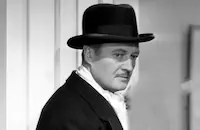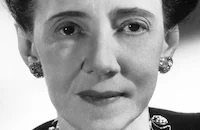Guilty As Hell
Cast & Crew
Erle C. Kenton
Edmund Lowe
Victor Mclaglen
Richard Arlen
Adrienne Ames
Henry Stephenson
Film Details
Technical Specs

Synopsis
Psychiatrist Ernest Tindal strangles his wife Ruth to death and leaves clues incriminating her lover, Frank Marsh. His plan works, and when her body is discovered, the watch-chain charm in Ruth's hand leads police Captain "Mack" McKinley and his journalist friend, Russell Kirk, to suspect the lover. When Frank is arrested, Kirk meets Frank's sister Vera, whom he had seen at a club on the night of the murder. Frank is found guilty and sentenced to be hanged. In his desire to impress Vera, Kirk unsuccessfully attempts to get a reprieve. In a friendly altercation with Mack, Kirk realizes that Ruth could not have gotten the charm during strangulation because her hands would be on the forearms, not the waist, of her murderer. Kirk and Mack then suspect Jack Reed, a gangster with whom Frank had dinner on the night of the murder. They believe he stole the watch-charm and gave it to the murderer. Reed escapes from them before they can question him, but is shot by Mack. Reed's wife Julia calls Tindal to their hideout to save her husband, but behind closed doors, Tindal kills Reed. Julia goes to to police headquarters seeking vengeance against Mack, but when evidence shows that Reed died at the hands of his doctor, she reveals Tindal's involvement. Tindal is arrested but kills himself with poisoned chewing gum. Frank gets a stay of execution, and Vera informs Kirk that she is engaged, foiling his plans of dating her.

Director
Erle C. Kenton
Cast

Edmund Lowe

Victor Mclaglen

Richard Arlen

Adrienne Ames

Henry Stephenson

Ralph Ince

Noel Francis

Elizabeth Patterson
Arnold Lucy
Willard Robertson
Richard Tucker
Fred Kelsey

Claire Dodd
Lillian Harmer
Earl Pingree
Gordon Westcott
Charles Sylber

William B. Davidson
Harold Berquist
Elsa Peterson
Clifford Dempsey
Oscar Smith
Crew

Film Details
Technical Specs

Quotes
Trivia
Notes
The pressbook notes that a new lighting device called the "glass wave," which diffuses light so shadows are diminished, was used for the first time in this film. Paramount released a remake of this film in 1937, entitled Night Club Scandal (see below).












